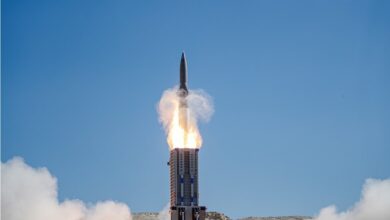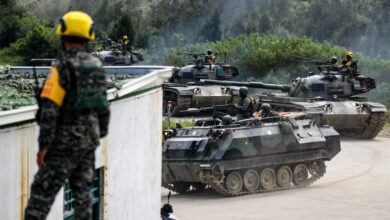
The shocking violence in Kabul raises the question many feared: has the US withdrawal strategy and exit given space for a renewed jihadist threat?
History helps answer this question. Unfortunately, history seems to be repeating itself – though not in the way Joe Biden’s administration feared. They were concerned with a never-ending presence in Afghanistan amid intractable conflict.
Yet, they seemed to have overlooked two important lessons, particularly with respect to jihadists in Afghanistan. If this neglect continues, it could contribute to the rise of jihadism in Afghanistan and an increase in overseas attacks.
Symbolic Victory for Jihadists
Firstly, withdrawal in Afghanistan has occurred before and it resulted in a huge symbolic victory for jihadists (despite their claims being exaggerated).
Afghanistan is a crucible for jihadist identity, especially for Al-Qaeda. The Afghan campaign of the 1980s against the USSR was a watershed moment. It was the first major gathering of, and victory for, a pan-Islamic jihadist movement — and even more significantly, it was against a global superpower.
The Afghan campaign focused the attention of militant jihadists and was pivotal in the formation of a generation of jihadists. For jihadists like Osama bin Laden, the Afghan campaign came at a crucial stage of life in which he, like many others, “discovered religious devotion and a militant commitment that gave his life meaning.”

Like the USSR in 1989, the US withdrawal has emboldened jihadists — both in Afghanistan and beyond, especially online.
What looks like a major defeat for the world’s leading superpower has provided new energy and propaganda for jihadists at a time when they are emerging from years of losses and the pandemic. The defeat of another global superpower in Afghanistan has reinvigorated jihadist hopes, with a likely upswing in recruitment and attacks like in Kabul.
Jihad’s Rallying Power
While the Afghan campaign’s aftermath was a civil war, it forged disparate national groups of Islamist fighters into a common cause against a much larger enemy and demonstrated the power and potency of jihad. This strategy was then deployed elsewhere, most infamously by Osama bin Laden.
The current threat is that the rallying power of jihad will be renewed in a similar way, though with a local focus to begin with. It could then shift internationally as it did in the 1990s, especially if there is a stalemate in Afghanistan.
While political and strategic circumstances have changed, the defeat of another global superpower in Afghanistan, with the help of jihadists, provides a major symbolic victory. Such a victory could still be squandered by jihadist groups (or used by the Taliban to suppress them), but it may provide jihadists with international impetus and a base from which to operate.
Afghanistan’s Volatile Mix
Secondly, withdrawal has produced a chaotic situation in Afghanistan, which jihadists are experts at exploiting as they have done in Iraq and Syria. Political and military upheaval, perceived weakness from the enemy (the US), and a sympathetic ruling force (Taliban) have created a volatile mix in Afghanistan.
Strategic withdrawals can work in certain circumstances, particularly if the threat has been sufficiently suppressed. But it is obviously dangerous to be mistaken about this, particularly regarding terrorist groups.

Despite President Biden’s claim that Al-Qaeda has been defeated and the belief that ISIS was suppressed, it is clearly not the case. The US may have miscalculated both what their military presence in Afghanistan meant (that is, some form of stability) and the latent threat of jihadist groups. Moreover, the rhetoric of shifting focus to China is strategically sound and flavor of the hour, but we must not neglect other, immediate threats.
Despite setbacks for jihadists in Afghanistan, the opposite of Biden’s remarks is true. Jihadist groups like Al-Qaeda have re-grouped in Afghanistan in recent years. Al-Qaeda recognized their strategic weakness and have used the last decade to forge stronger battlefield links with the Taliban, as a recent UN report notes. Al-Qaeda’s connections with the Taliban’s Haqqani Network are troubling and have implications for the future.
Even the local ISIS branch (ISIS-Khorasan) — which has suffered large losses — maintains an operational capacity, even to the extent that it can launch a quick and deadly strike in Kabul against the US.
In recent years, ISIS-K has been targeted by the US, the former Afghan military, and the Taliban, but remains dangerously active. ISIS may have limited capacity to strike outside of Afghanistan, but we must be prepared for this prospect, especially with the morale boost they have received in recent days.
Risk of Repeating History
While the short-term hope is that the Taliban will suppress ISIS and disassociate itself from Al-Qaeda, we are at risk of repeating history. The West took its attention away from Afghanistan in the 1990s once the USSR withdrew. It cannot afford to make the same mistake after the US withdrawal.
As the Biden Administration has shown, the US still has the military capacity to have an impact on jihadist groups in Afghanistan. While it will be more difficult without troops on the ground, it must use whatever political, military and intelligence capacity it has in a Taliban-run Afghanistan to monitor jihadist groups and prevent jihadist attacks.
 Joel Hodge (PhD, University of Queensland) is Senior Lecturer in the Faculty of Theology and Philosophy, Australian Catholic University (ACU), based at St Patrick’s Campus, Melbourne. He is author of Violence in the Name of God: The Militant Jihadist Response to Modernity (Bloomsbury, 2020) and Resisting Violence and Victimisation: Christian Faith and Solidarity in East Timor (Ashgate/Routledge, 2012). He is co-editor of the book series, Violence, Desire, and the Sacred (Bloomsbury Academic), as part of which he has co-edited five volumes, including Does Religion Cause Violence? Multidisciplinary Perspectives on Violence and Religion in the Modern World. He has published articles in journals such as South East Asia Research, Modern Theology, and Political Theology, and has written for various media outlets.
Joel Hodge (PhD, University of Queensland) is Senior Lecturer in the Faculty of Theology and Philosophy, Australian Catholic University (ACU), based at St Patrick’s Campus, Melbourne. He is author of Violence in the Name of God: The Militant Jihadist Response to Modernity (Bloomsbury, 2020) and Resisting Violence and Victimisation: Christian Faith and Solidarity in East Timor (Ashgate/Routledge, 2012). He is co-editor of the book series, Violence, Desire, and the Sacred (Bloomsbury Academic), as part of which he has co-edited five volumes, including Does Religion Cause Violence? Multidisciplinary Perspectives on Violence and Religion in the Modern World. He has published articles in journals such as South East Asia Research, Modern Theology, and Political Theology, and has written for various media outlets.
Disclaimer: The views and opinions expressed here are those of the author and do not necessarily reflect the editorial position of The Defense Post.
The Defense Post aims to publish a wide range of high-quality opinion and analysis from a diverse array of people – do you want to send us yours? Click here to submit an op-ed.











